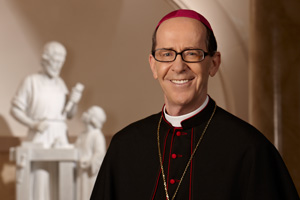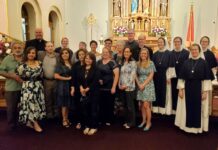
“…where there is an unjust aggression, I can only say that it is licit to stop the unjust aggressor. I emphasize the word ‘stop’. I’m not saying ‘drop bombs,’ ‘make war,’ but ‘stop the aggressor.’”

[dropcap type=”4″]A[/dropcap]fter making numerous efforts to promote reconciliation and peace — in the Holy Land, Iraq, Syria, Korea, and other countries — many were astonished when, asked about terrorism, Pope Francis upheld the right to use force to stop unjust aggression and terrorist acts. Was the Holy Father giving up on prayer and negotiations for peace? Or was he signaling the complex nature of peace making?
More than the absence of war
In “The Joy of the Gospel” the Holy Father says (#218f), “Peace in society cannot be understood as pacification or the mere absence of violence resulting from the domination of one part of society over others… Nor is peace simply the absence of warfare, based on a precarious balance of power; it is fashioned by efforts directed day after day towards the establishment of the ordered universe willed by God.”
Pope Francis’ contention that it is legitimate to stop the unjust aggressor is based on principles enunciated in the Church’s “just war” doctrine. The Catechism of the Catholic Church (#2309) spells out four “strict conditions for legitimate defense by military force.” If we review those four conditions, it can help us to understand when it is morally legitimate to “stop” the aggressor, and how this can be an important step on the path to peace.[quote_box_right]
Pope Francis’ Game Plan
Read more columns from this series by Bishop Olmsted.
[/quote_box_right]
Action for peace requires careful weighing of various factors, prayerful discernment and prudential judgment. There are things that leaders of government can do, and things that the pope can do. There are also things that you and I can do in our personal lives and as faithful citizens.
Be responsible citizens
The Holy Father writes (#220), “People in every nation enhance the social dimension of their lives by acting as committed and responsible citizens, not as a mob swayed by the powers that be. Let us not forget that responsible citizenship is a virtue, and participation in political life is a moral obligation.”
If we wonder how we can contribute to peace in the world, these words of Pope Francis remind us that it begins by being good citizens. It is not a question of doing great things of notoriety but doing ordinary things with perseverance, prudence and charity.
We need (#223f) “to work slowly but surely, without being obsessed with immediate results… generating processes of people-building, as opposed to obtaining immediate results which yield easy, quick short-term political gains, but do not enhance human fullness.”
Unity prevails over conflict
In this world, scarred by original sin, it is irresponsible to ignore conflict. At the same time, it does no good to get so overwrought about conflict as to sink into pessimism and lose confidence in the merciful providence of God.
What Pope Francis proposes for peacemaking (#227) “is the willingness to face conflict head on, to resolve it and to make it a link in the chain of a new process… In this way it becomes possible to build communion amid disagreement, but this can only be achieved by those great persons who are willing to go beyond the surface of the conflict and to see others in their deepest dignity. This requires acknowledging a principle indispensable to the building of friendship in society: namely, that unity is greater than conflict.”
Unity is able to prevail over conflict because of the victory won by Jesus Christ who, as St. Paul writes (Col 1:20), is always “making peace through the blood of His Cross.”
Not bystanders on the sidelines
As the preparations for the general election in November ramp up, in a year that has witnessed horrible scenes of beheadings and other atrocities in Iraq and other places, it is good for us to remember that we are not bystanders on the sidelines of world events but missionary disciples of Jesus sent into the world to live the Beatitude (Mt 5:9), “Blessed are the peacemakers.”
In other words, we need to pray and to act on behalf of the common good. We may not hold public office, although politics is an honorable and necessary profession, but we can still be faithful servants of Christ and good citizens. Accordingly, it is our right and duty to be well informed about the issues and the candidates, and then to vote on the basis of a well formed conscience.
We are living in a time when threats to innocent human life are seemingly everywhere. From the taking of innocent human life through abortion and euthanasia to the increased loss of human life through acts of terrorism, we must take action.
Now, more than ever, we need responsible citizens and elected leaders who are committed to the common good and the dignity of every human person.





![[VIDEO] Make Sunday feel like Sunday again](https://www.catholicsun.org/wp-content/uploads/2021/04/2021-YOUTUBE-BISHOP-MESSAGE-THUMBNAIL-ENGLISH-218x150.png)